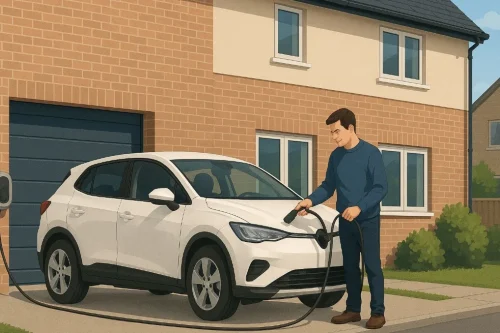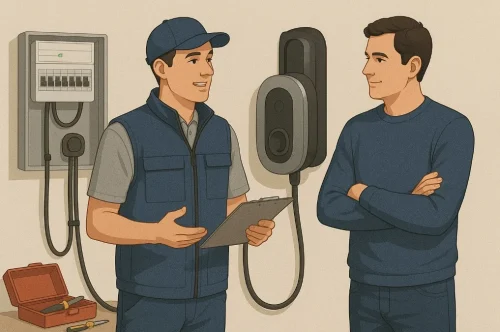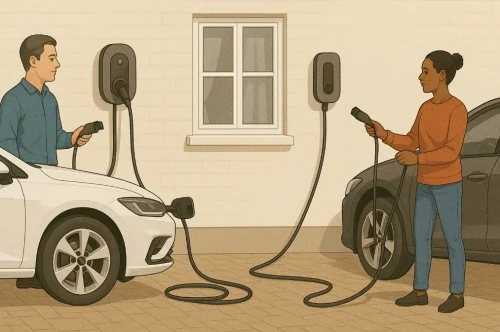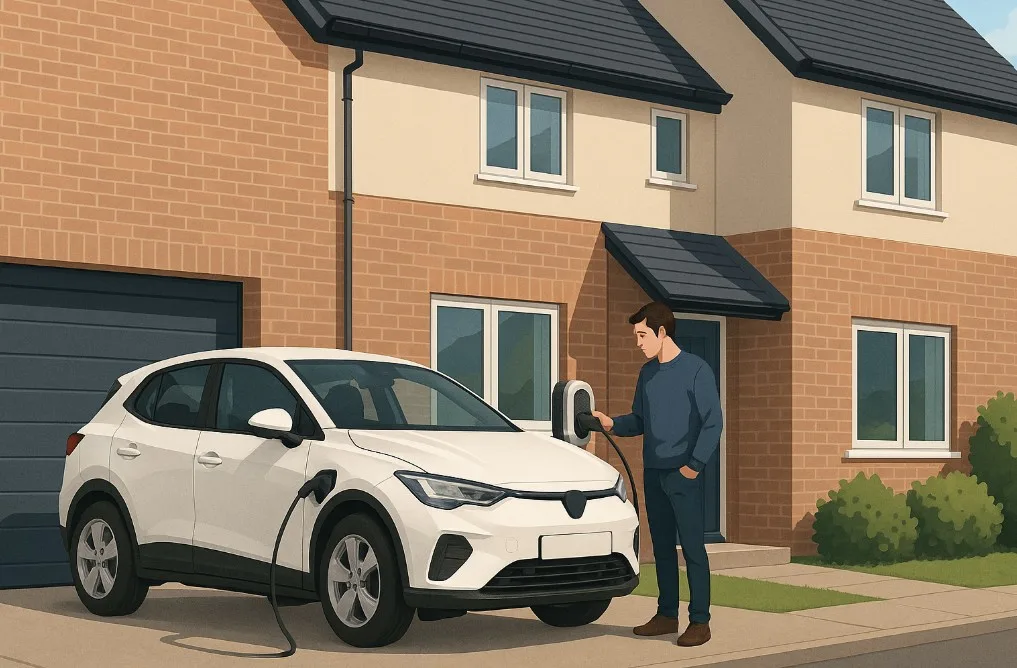Table of Contents
The demand for electric vehicles (EVs) is growing rapidly across the UK, pushing more homeowners to explore home charging solutions. Installing a home electric car charger offers convenience, cost savings, and long-term benefits for EV owners.
However, many remain unsure about the actual installation cost. Understanding the typical expenses, available grants, charger types, and influencing factors can help you make an informed decision.
This blog breaks down everything you need to know, including pricing, grant eligibility, savings tips, and more.
What Is a Home Electric Car Charger?

A home electric car charger is a dedicated charging unit installed at your property to recharge your electric vehicle’s battery safely and efficiently. Unlike a standard plug socket, a home charger is designed to deliver higher power, resulting in faster charging times.
Most residential chargers in the UK are 3kW or 7kW, with 7kW being the most common for daily use. These chargers connect directly to your home’s electrical supply and are typically mounted on an external wall or inside a garage.
The unit is compatible with most electric vehicles and provides a reliable, consistent charging experience without relying on public networks.
Why Do You Need One?
Charging your EV at home is not only convenient but also cost-effective and efficient. Relying on public charging points can be expensive and less reliable. A home charger allows you to:
- Charge overnight during cheaper energy tariff periods
- Avoid waiting times and queues at public stations
- Fully charge your EV while it’s parked at home
- Control charging remotely via smart apps (if applicable)
- Reduce long-term fueling costs compared to petrol or diesel vehicles
Home chargers also improve safety by eliminating the risks associated with charging via a standard 3-pin socket, which is not designed for long charging sessions. Over time, a home charger becomes a wise investment for regular EV users.
What Is the Typical Cost of Installing a Home EV Charger in the UK?
The average cost of installing a home EV charger in the UK ranges from £500 to £1,100. A standard 7kW charger with installation typically costs between £900 and £1,000.
However, the final cost may vary based on the charger model, property type, installation complexity, and additional equipment needed. Some companies offer bundled deals that include both the charger and installation.
Below is a breakdown of typical costs:
| Charger Type | Estimated Cost (Including Installation) |
| Basic 3kW Charger | £500 – £700 |
| Standard 7kW Charger | £900 – £1,000 |
| Smart 7kW Charger | £1,000 – £1,100 |
| Additional Cabling (Over 10m) | +£100 – £200 |
| Fuse Board Upgrade | +£100 – £300 |
These figures provide a general estimate and should be confirmed with a pre-installation quote for accuracy.
What Factors Influence the Installation Cost of an EV Charger?

Several key factors can influence the total cost of installing a home EV charger in the UK. Understanding these will help you anticipate expenses and plan your budget effectively.
Key Cost Influencing Factors Include:
- Charger Model:
- Basic chargers start at around £600
- Smart chargers with Wi-Fi, apps, or solar integration cost £900–£1,100
- Installation Complexity:
- Standard installations within 10m of your power source are cheaper
- Installations requiring long cabling routes add £100–£200
- Wall drilling, cable routing, or groundworks increase complexity
- Electrical Setup:
- Older homes may need fuse board upgrades or rewiring
- Upgrade costs range from £100 to £300 depending on condition
- Property Type:
- Detached homes with easy access cost less
- Flats or terraced homes with limited access may require additional work
- Installer Packages:
- Some companies include standard installation in the package
- Additional customisation will increase the cost
Each home is unique, and factors such as wiring condition, fuse box capacity, parking layout, and distance from the power supply can all affect installation costs.
Are Government Grants Available for EV Charger Installation in the UK?
Yes, the UK government offers the Electric Vehicle Homecharge Scheme (EVHS) through the Office for Zero Emission Vehicles (OZEV), which provides a grant of up to £350 toward the cost of installing a home EV charger.
However, the grant is available only to renters, flat owners, or those living in leased properties with off-street parking.
Key Points About the Grant:
- Valid until 31 March 2026
- Requires use of an OZEV-approved installer
- Applicants must have dedicated off-street parking
- The grant is automatically applied via the installer
This grant can significantly reduce your upfront investment if you meet the eligibility criteria.
What Are the Differences Between Tethered and Untethered EV Chargers?

When choosing a charger, you’ll come across two main types: tethered and untethered. Each has its pros and cons based on usage, vehicle compatibility, and personal preference.
| Feature | Tethered Charger | Untethered Charger |
| Cable Type | Fixed, built-in cable | No built-in cable (plug in separately) |
| Convenience | Quicker and simpler to use | Requires you to carry a cable |
| Compatibility | May not fit all EVs | Universal compatibility with cable |
| Aesthetic Appearance | Bulkier design | Sleeker, minimal look |
| Future-proofing | Less flexible | Easily switch cable for future EVs |
Tethered units are ideal for daily convenience, while untethered ones provide flexibility if you change vehicles or share charging with others.
Is an Untethered Charger More Flexible for Future EVs?
Yes, untethered chargers offer greater flexibility, especially if you plan to change or upgrade your EV in the future.
Since the charger does not have a fixed cable, you can easily replace the plug to match your new vehicle’s connector.
This also makes it more universal, allowing friends or guests with different EVs to use it with their own charging cables. It’s a preferred choice for those looking for long-term convenience and adaptability.
Do You Need Planning Permission to Install a Home EV Charger?
In most cases, planning permission is not required to install a home EV charger in the UK, as long as you have off-street parking and the installation meets standard conditions. However, there are some exceptions.
Situations That May Require Permission:
- Your property is listed or in a conservation area
- Installation impacts shared spaces in flats or apartments
- You plan to mount the charger on a boundary wall or fence
It’s always best to check with your local planning authority if your situation is unique. For most single-family homes with driveways, installation can proceed without planning concerns.
How Long Does It Take to Install a Home Charging Station?
Most home EV charger installations in the UK take 2 to 4 hours to complete. The actual time may vary based on the complexity of the job and your home’s electrical system.
The Process Generally Includes:
- A pre-installation survey to assess suitability
- Mounting the unit on an external wall
- Running cabling to the fuse board
- Testing and commissioning of the charger
- Demonstration of how to use the charger
If upgrades are needed, such as fuse board modifications or long cable routing, the job may take longer.
How Can You Save Money on EV Charger Installation and Charging Costs?

Saving money on EV charger installation and ongoing charging costs is about making smart choices from the start. By considering grants, installation options, and energy tariffs, you can keep expenses low without sacrificing convenience.
Practical ways to reduce costs:
- Use a government grant: Claim up to £350 off installation if eligible.
- Compare installation packages: Some providers include free installation with certain chargers.
- Choose the right energy tariff: Switch to EV-friendly tariffs with cheaper off-peak rates.
- Minimise installation complexity: Install near your fuse box to cut extra cabling costs.
- Avoid unnecessary features: Skip smart functions you don’t need to save money.
By being selective and planning carefully, you can cut installation costs and enjoy affordable, efficient charging for years to come.
Can a Smart EV Charger Help You Save Money in the Long Run?
Yes, smart EV chargers can lead to significant long-term savings by allowing you to schedule charging during off-peak hours when electricity rates are lower.
They often integrate with smart energy tariffs and solar panels, allowing you to monitor consumption and optimise efficiency.
This not only saves money on daily use but also helps manage your home’s energy load more intelligently.
Conclusion
Installing a home electric car charger is an investment that offers convenience, control, and long-term savings. Costs typically range from £500 to £1,100, influenced by charger type, installation complexity, and your home’s electrical condition.
With government grants available and smart chargers offering further cost savings, now is a great time to make the switch.
Always compare options, assess your home’s setup, and choose a certified installer to ensure safety and reliability.
Frequently Asked Questions
Can you charge your EV using a regular plug socket at home?
Yes, but it’s slow and not recommended for regular use due to safety and efficiency concerns.
Do you need planning permission to install an EV charger in the UK?
Not usually, unless your property is listed or located in a conservation area.
How do you know if your home is suitable for an EV charger?
A professional survey will assess your parking setup, wiring, and electrical capacity.
Will you need a three-phase power supply for a home charger?
No, most home EV chargers in the UK work on a standard single-phase supply.
Can you move your charger to a new home if you move house?
Yes, but you’ll need a qualified installer to remove and reinstall it properly.
How often should your EV charger be maintained or checked?
It should be inspected annually to ensure safety and optimal performance.
Are your solar panels compatible with a home EV charger?
Yes, if your charger and inverter are compatible with solar energy systems.




